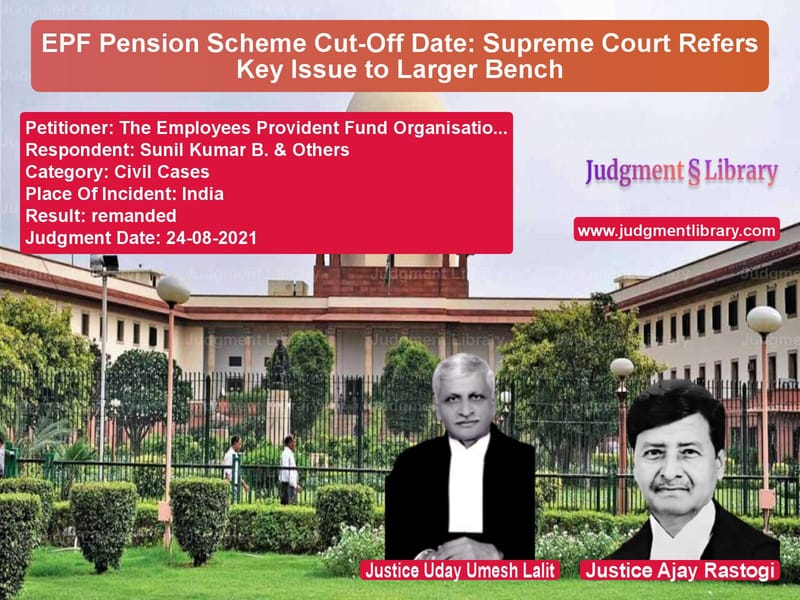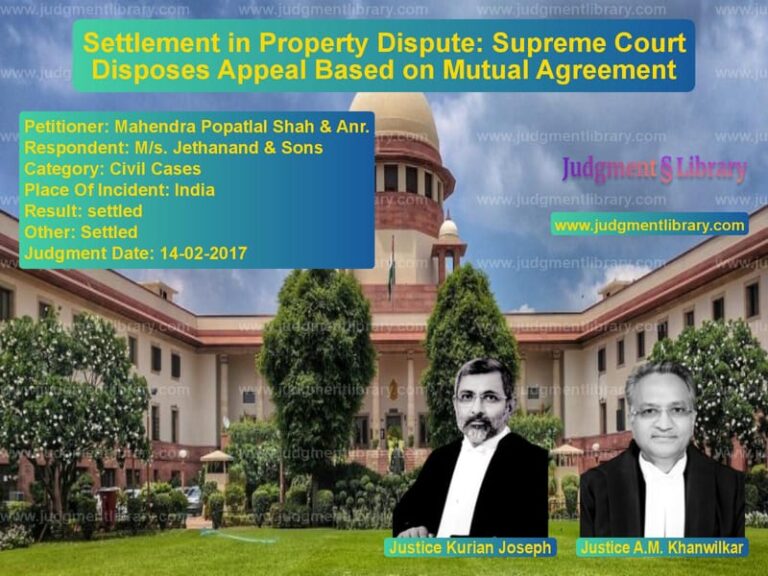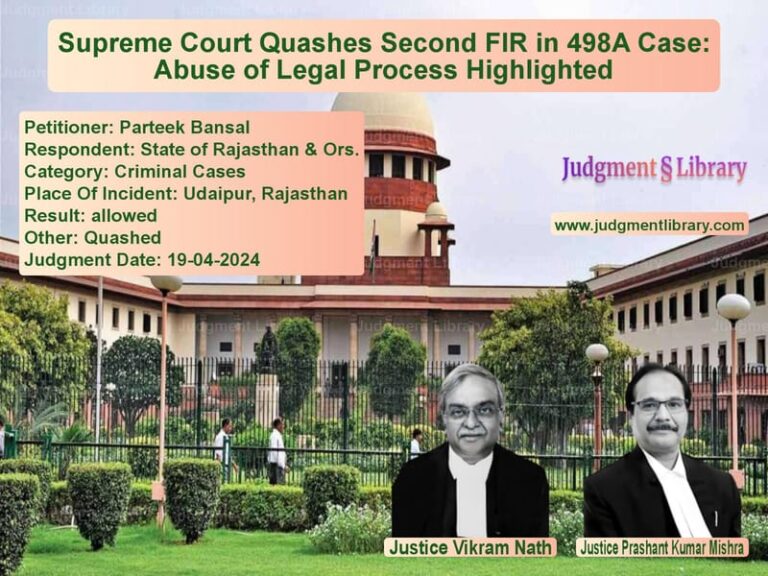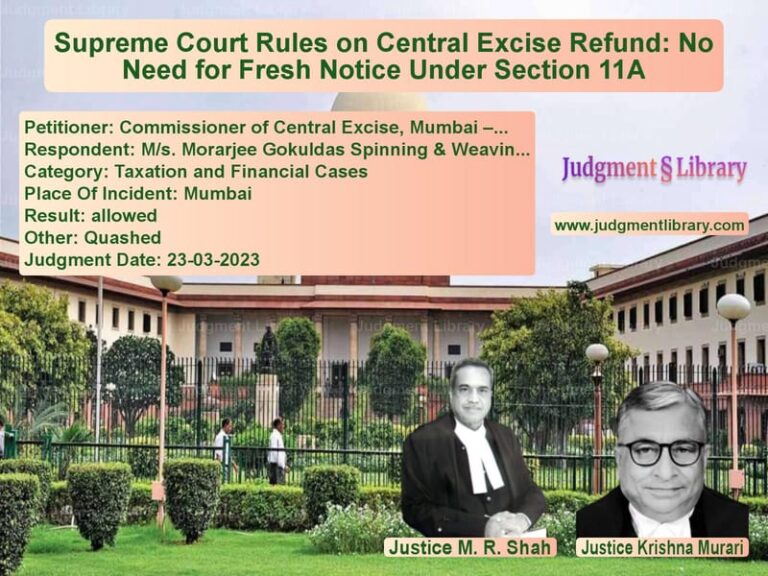EPF Pension Scheme Cut-Off Date: Supreme Court Refers Key Issue to Larger Bench
The case of The Employees Provident Fund Organisation vs. Sunil Kumar B. is a crucial ruling regarding the Employees’ Pension Scheme (EPS) under the Employees’ Provident Funds and Miscellaneous Provisions Act, 1952. The Supreme Court was tasked with deciding whether there is a legally valid cut-off date under Paragraph 11(3) of the Employees’ Pension Scheme, 1995, and whether the earlier decision in R.C. Gupta & Ors. vs. Regional Provident Fund Commissioner would serve as the governing principle for all related cases.
This case emerged as a result of multiple petitions challenging the validity of the cut-off date imposed under the 2014 amendments to the EPS, which restricted employees from contributing to the pension scheme based on their actual salaries beyond a certain date.
Background of the Case
The dispute revolves around the eligibility of employees to opt for pension contributions beyond the statutory ceiling of Rs. 5,000 (later revised to Rs. 6,500 and subsequently Rs. 15,000). Key facts of the case include:
- The Employees’ Pension Scheme (EPS) was introduced in 1995 to provide pension benefits to employees covered under the EPF Act.
- The EPS allowed employees to contribute a percentage of their salary towards pension benefits, with an upper salary limit set for contribution.
- Through amendments in 2014, a cut-off date of September 1, 2014 was introduced, restricting employees who had not opted for higher pension contributions before this date.
- Employees challenged the amendment, arguing that it was arbitrary and prevented them from availing pension benefits despite contributing based on actual salaries.
- The High Courts of Kerala, Delhi, and Rajasthan delivered varying judgments on the issue, leading to the matter reaching the Supreme Court.
Petitioner’s Arguments
The Employees Provident Fund Organisation (EPFO) and the Union of India contended that:
- The cut-off date in the 2014 amendment was necessary to ensure financial sustainability of the pension fund.
- The decision in R.C. Gupta (2016), which ruled in favor of allowing employees to opt for higher pension contributions retrospectively, was incorrect and needed reconsideration.
- The introduction of a cut-off date was a policy decision and could not be interfered with by the courts.
- Allowing retrospective pension contributions would create a financial imbalance and lead to unfair cross-subsidization.
Respondent’s Arguments
The employees and pensioners argued that:
- The EPS is a social security measure, and the right to pension should not be arbitrarily restricted by a cut-off date.
- The 2014 amendment was unconstitutional as it violated Articles 14 and 21 of the Indian Constitution.
- Employees who had contributed on their actual salaries should not be denied pension benefits merely due to a technical restriction.
- The R.C. Gupta decision correctly interpreted the law, allowing employees to contribute towards higher pensions even if they had not exercised an option earlier.
Key Legal Issues
The Supreme Court examined the following legal issues:
- Whether the cut-off date of September 1, 2014, in the 2014 amendment was legally valid.
- Whether the principle laid down in R.C. Gupta should be the governing rule for EPS-related cases.
- Whether employees who had not opted for higher pension contributions before the cut-off date could still be allowed to contribute retrospectively.
Court’s Observations
The Supreme Court made several important observations:
- On the Cut-Off Date: The Court noted that the introduction of a cut-off date arbitrarily divided pensioners into different categories, leading to discrimination.
- On R.C. Gupta Precedent: The Court observed that the decision in R.C. Gupta had not adequately considered financial implications and policy considerations.
- On the Pension Scheme’s Financial Stability: The Court recognized the EPFO’s concern regarding financial sustainability but emphasized that social security benefits cannot be arbitrarily restricted.
Final Verdict
The Supreme Court referred the matter to a larger bench, stating that:
- The issue of whether a cut-off date can be imposed under EPS requires further deliberation.
- The decision in R.C. Gupta needs to be reconsidered in light of the financial implications.
- Pending cases related to EPS pension eligibility should await the final decision of the larger bench.
The Court concluded:
“The principal questions that arise for consideration are whether there would be a cut-off date under paragraph 11(3) of the Employees’ Pension Scheme and whether the decision in R.C. Gupta would be the governing principle on the basis of which all these matters must be disposed of.”
Implications of the Judgment
This ruling has significant implications for pensioners and the EPFO:
- Potential Relief for Pensioners: If the larger bench rules in favor of employees, pensioners who missed the deadline may still be eligible for higher pensions.
- Financial Burden on EPFO: A ruling against the cut-off date could increase liabilities for EPFO and require adjustments to the pension fund.
- Policy Clarity: The judgment will establish clear guidelines on how pension benefits should be structured in the future.
- Impact on Social Security Law: The ruling will influence future decisions on pension-related rights and policy-making.
Overall, the Supreme Court’s decision to refer the matter to a larger bench ensures a more comprehensive examination of the Employees’ Pension Scheme and its applicability to various categories of employees.
Petitioner Name: The Employees Provident Fund Organisation.Respondent Name: Sunil Kumar B. & Others.Judgment By: Justice Uday Umesh Lalit, Justice Ajay Rastogi.Place Of Incident: India.Judgment Date: 24-08-2021.
Don’t miss out on the full details! Download the complete judgment in PDF format below and gain valuable insights instantly!
Download Judgment: the-employees-provid-vs-sunil-kumar-b.-&-oth-supreme-court-of-india-judgment-dated-24-08-2021.pdf
Directly Download Judgment: Directly download this Judgment
See all petitions in Pension and Gratuity
See all petitions in Employment Disputes
See all petitions in Public Sector Employees
See all petitions in Recruitment Policies
See all petitions in Contractual Employment
See all petitions in Judgment by Uday Umesh Lalit
See all petitions in Judgment by Ajay Rastogi
See all petitions in Remanded
See all petitions in supreme court of India judgments August 2021
See all petitions in 2021 judgments
See all posts in Civil Cases Category
See all allowed petitions in Civil Cases Category
See all Dismissed petitions in Civil Cases Category
See all partially allowed petitions in Civil Cases Category







